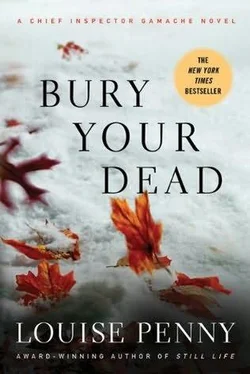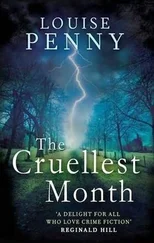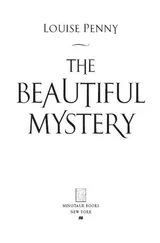Louise Penny - Bury Your Dead
Здесь есть возможность читать онлайн «Louise Penny - Bury Your Dead» весь текст электронной книги совершенно бесплатно (целиком полную версию без сокращений). В некоторых случаях можно слушать аудио, скачать через торрент в формате fb2 и присутствует краткое содержание. Жанр: Старинная литература. Описание произведения, (предисловие) а так же отзывы посетителей доступны на портале библиотеки ЛибКат.
- Название:Bury Your Dead
- Автор:
- Жанр:
- Год:неизвестен
- ISBN:нет данных
- Рейтинг книги:4 / 5. Голосов: 1
-
Избранное:Добавить в избранное
- Отзывы:
-
Ваша оценка:
- 80
- 1
- 2
- 3
- 4
- 5
Bury Your Dead: краткое содержание, описание и аннотация
Предлагаем к чтению аннотацию, описание, краткое содержание или предисловие (зависит от того, что написал сам автор книги «Bury Your Dead»). Если вы не нашли необходимую информацию о книге — напишите в комментариях, мы постараемся отыскать её.
Bury Your Dead — читать онлайн бесплатно полную книгу (весь текст) целиком
Ниже представлен текст книги, разбитый по страницам. Система сохранения места последней прочитанной страницы, позволяет с удобством читать онлайн бесплатно книгу «Bury Your Dead», без необходимости каждый раз заново искать на чём Вы остановились. Поставьте закладку, и сможете в любой момент перейти на страницу, на которой закончили чтение.
Интервал:
Закладка:
“He was a nut,” one elderly man said from the back.
“So you do know him,” said Gamache. “Yes, he was a nut to some, a hero to others. He was something else entirely in our story.”
Gamache glanced at Émile, who was looking out the window. Distancing himself from what was about to happen? Gamache wondered.
“Father Chiniquy was famous for one thing,” said the Chief. “He wanted to save alcoholics. To do that he went to where he’d find them. In the Québec of the 1860s that was rue du Petit-Champlain, directly below us.”
Indeed, if he could throw himself out that window with enough force he’d sail over the Dufferin Terrace and land on rue du Petit-Champlain below. Now a charming, cobbled street filled with lace stores and cafés and tourist shops, but back then it was the notorious Basse-Ville. Filled with drunks and blackguards and prostitutes, filled with sewage and disease.
Filled with poor French workers and Irish immigrants. And a fallen priest determined to save them and maybe himself.
“One summer’s evening Chiniquy was in a bar scouting souls when he overheard a conversation between two Irishmen. Patrick and O’Mara. They’d been hired as diggers in the Upper Town to hack out a basement under an old building. There were more than twenty laborers on the site, but it was Patrick and O’Mara who made the discovery. They found something they believed might be valuable.”
Despite themselves the members of the Société Champlain had grown interested. A few still looked annoyed and impatient but even they were listening. Only Émile continued to stare out the window.
What was he thinking? Gamache wondered. Did he see what was coming, know what was coming?
But it didn’t matter. It was too late.
“Chiniquy listened to the two men and as he listened he grew more interested. Finally he joined them. The men, knowing who Chiniquy was, weren’t overly welcoming at first but once the priest offered to buy them drinks they warmed up. And after a few more drinks they told him what they’d found.
“It was a coffin. At first Chiniquy was disappointed. Old Quebec City was practically built on coffins, built on bones. Not finding one would have been unusual. Surely these workers knew that. But this one was different, they said, it was heavy.
“The two men figured this was not only unusual but perhaps even valuable. They’d dragged it from the work site down the hill to Patrick’s home. His wife refused to have it inside. He insisted, but knew he couldn’t keep it there for long. The home was little more than a shack, and already crowded with Patrick, his wife and six kids. Now there was also a dead man.”
Gamache examined his audience. They were all listening now, including Émile. They could see the scene, as could Gamache. The trampled and discouraged Irish woman. Having survived the harrowing voyage to her New World, she’d found it even worse than the humiliation and famine she’d fled and, as though life wasn’t difficult enough, her husband had brought a corpse home from work.
“The men set about opening it, carefully prying the sealed lid off,” Gamache continued the story. “Imagining why it was so heavy. It must, they felt, be filled with gold, with jewelry, with silver. This must be the coffin of a very rich person. But once opened, they were sorely disappointed. There was nothing inside except a ratty old book, a bible, and some remains. Bones and bits of clothing. It was heavy because it was lead-lined.”
There was a small stir in the room. Did they know where this was headed?
“Patrick and O’Mara had been in the bar discussing how best to strip the lead, sell it then dump the body into the river, the bible with it. They couldn’t read, so it was useless. Chiniquy asked to see the bible. At that stage the men grew wary. Then the priest tried another tack. If they would bring the coffin and the bible to the Literary and Historical Society the next night, Chiniquy could promise them a small reward.
“Why? the men had asked.
“Because they collect everything historic, especially books. This coffin might be old, Chiniquy reasoned.
“Patrick and O’Mara were already half drunk and didn’t really care. If there was money they’d be there. The next night they showed up and were met by Father Chiniquy and another man. James Douglas.”
“Is there a point to this?” one of the members of the Société Champlain asked.
“Please, Benoît,” René Dallaire looked pained. “Civility.”
“I’ll be civil when he stops wasting my time.”
“There is a point, monsieur , and we’re almost there,” said Gamache. He could feel his phone buzzing but couldn’t very well look at it now. “I’m sure you’ve heard of Dr. Douglas?”
There were nods.
“He opened the coffin and examined the contents while Father Chiniquy looked at the bible. Then James Douglas made a mistake. He offered Patrick and O’Mara five hundred dollars each. Chiniquy was furious, but said nothing. The workers immediately knew something was up. That was a small fortune, way too much for the remains of some long-dead guy and a ratty old bible.
“They refused, insisting on one thousand dollars each, and they got it but only after Douglas had secured their pledge of secrecy and found out where they lived. The Irishmen, who hated the English, also feared them. They knew what lay behind the civilized veneer. They knew what an Englishman was capable of, if crossed. Patrick and O’Mara agreed, then carried the coffin to the basement and left.”
His phone buzzed again. Still Gamache ignored it.
“How do you know all this?” someone asked.
“Because I found this.”
Gamache bent down to his satchel and removed a black leather book. As he held it he looked at Émile who looked surprised, and something else. Was that a small smile? A grin or a grimace?
“It’s Father Chiniquy’s journal for the year 1869. Augustin Renaud found it and recognizing its significance he hid it.”
“Where was it?” Émile asked.
“The library of the Literary and Historical Society,” said Gamache, staring at his mentor.
“Augustin Renaud hid the journal in a library?” asked René Dallaire.
“No,” clarified Gamache. “His murderer did.”
“Why’re you telling us all this?” Jean Hamel, slender and contained and sitting next to René Dallaire as always, asked.
“I think you know why,” said Gamache, looking the man directly in the eyes until Hamel lowered his.
“Where did you say the Irish workers were digging?” a member asked.
“I didn’t, but I can tell you. It was under the Old Homestead.”
The room grew very quiet. Everyone stared at Gamache.
“You found the other book, didn’t you,” said Émile into the silence.
“I did.”
Gamache reached into the satchel, now on his lap. The satchel he’d spent the last few hours protecting.
“Last year the Literary and Historical Society sold a number of boxes of books, boxes they hadn’t bothered to examine. Augustin Renaud bought some of them. When he went to see what he had he found they were from the collection of Father Charles Chiniquy. Not very promising, for a Champlain scholar—”
The use of the word “scholar” brought some harrumphs.
“—so he didn’t hurry to read them. But eventually, scanning them, he came across something extraordinary. He made mention of it in his own diary, but in true Renaud fashion he was”—Gamache searched for the word—“guarded.”
“Don’t you mean demented?” asked Jean Hamel. “Nothing he said or wrote can be trusted.”
“No, I mean guarded. And he was quite right. What he’d found was staggering.”
Gamache withdrew another black leather book. This one was larger, thicker than the first. Frayed and brittle, but in good condition. It had not seen the sun for hundreds of years then, dug up, it had sat anonymously on the bookshelves of Father Chiniquy’s home for thirty years until his death.
Читать дальшеИнтервал:
Закладка:
Похожие книги на «Bury Your Dead»
Представляем Вашему вниманию похожие книги на «Bury Your Dead» списком для выбора. Мы отобрали схожую по названию и смыслу литературу в надежде предоставить читателям больше вариантов отыскать новые, интересные, ещё непрочитанные произведения.
Обсуждение, отзывы о книге «Bury Your Dead» и просто собственные мнения читателей. Оставьте ваши комментарии, напишите, что Вы думаете о произведении, его смысле или главных героях. Укажите что конкретно понравилось, а что нет, и почему Вы так считаете.











